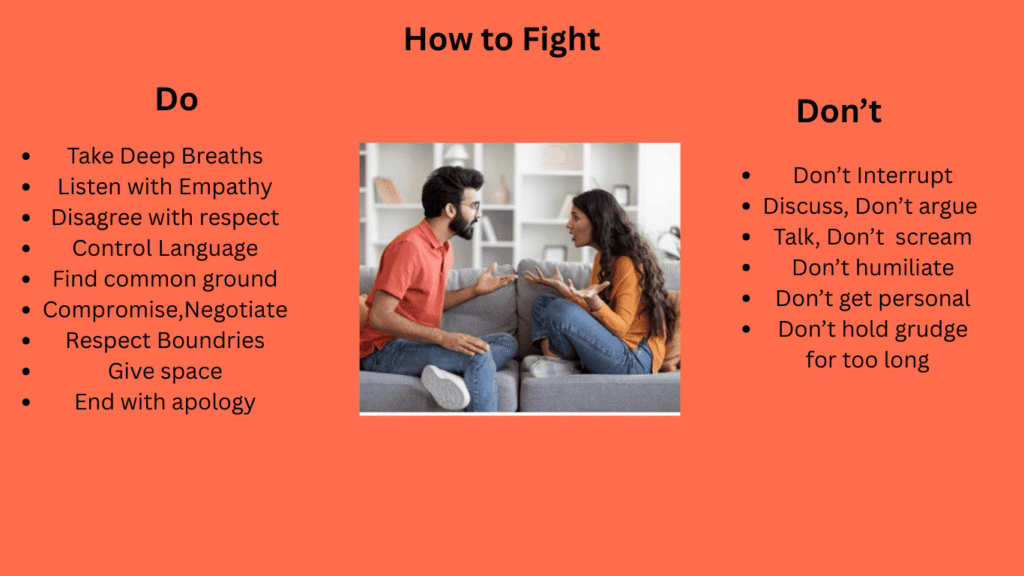
Fight Guide for Couples: How to Fight and Resolve Conflicts Lovably
Conflicts among couples are natural, common, and universal. A healthy relationship isn’t defined by the absence of fights, but by the ability to handle conflicts constructively. If left unresolved, disagreements can severely damage a relationship. This fight guide for couples offers essential relationship advice on how to fight and resolve conflicts—lovably.
Table Of Content
- Why Conflicts Arise in a Complex Relationship
- The Genesis of Conflicts: Lack of Communication
- How to Resolve Conflicts Effectively and Lovably
- Essential Do’s and Don’ts for Conflict Resolution
- Self Control
- Communication
- Mindset
- Handling Difficult Conversations
- The Role of Communication and Love Languages
- Conclusion: Fighting Like Tom and Jerry
Why Conflicts Arise in a Complex Relationship
When a man and woman decide to live together, the romantic relationship naturally becomes complex. Beyond the initial “honeymoon phase” (driven by a dopamine rush that eventually fades), conflicts arise due to:
- Gender Differences: As the metaphor suggests, “Men are from Mars, Women are from Venus.” Men and women handle stress, problems, and emotional needs differently. For example, men seek Space, Respect, and Trust, while women desire Commitment, Care, and Communication. Opposites attract, but they also cause conflicts.
- Differing Backgrounds: Partners come from unique families, cultures, and financial backgrounds.
- Fading Romance: In the initial years, the couple tend to show & see only the best in each other. This is the Romantic stage of relationship. Couple feels on a “High”, under the influence of Dopamine rush. But this stage can not & does not last for ever. Romantic feelings begin to fade , Dopamine is gradually replaced by Cortisol. Couple begins to see the not so good in each other. Differences & dislikes become points of discussion. Wet towel on bed & dining table manners start to irritate. Views collide. Conflicts arise and discussions frequently turn into fierce arguments.
The Genesis of Conflicts: Lack of Communication
The single most important cause of friction and conflict is a lack of effective communication. Meaningful discussion is must with regards to important aspects of married life such as :
- Personal & Mutual Goals
- Finances
- Household Chores
- Family, Kids , In laws
- Mutual power balancing
- Physical & emotional intimacy
In absence of proper communication, Differing expectations and unmet needs with respect to above, pile up gradually. These piled up resentments eventually turn simple discussions into fierce arguments.
How to Resolve Conflicts Effectively and Lovably
Conflicts must be resolved timely, amicably, and with love. The key to resolution is effective communication and the ability to handle disagreements with empathy and understanding. Always aim to find common ground. Remember: marriage is about commitment, not competition.

Essential Do’s and Don’ts for Conflict Resolution
Follow these rules before, during, and after a conflict to ensure you resolve issues without causing long-term hurt:
Self Control
- Deep Breathing : Deep Breaths keep fiery emotions under check. take deep breaths when you feel rage building up
Communication
- Discuss , Don’t Argue : Aim to find a solution through Discussion. Don’t Argue. Don’t adopt “I am Right, you are wrong ” attitude
- Listen with Empathy : Listen & try to understand what your partner means to say. Listen to understand, not to react back. Don’t interrupt. Let them finish what they want to say.
- Look for non-verbal cues : Do you know 93% of our communication is non-verbal. Pay attention to their tone, body language , facial expressions. Try to gauge their feelings & emotions.
- Talk, Don’t shout : Talk about differences. Don’t shout. When we shout, listener’s mind gets overwhelmed with harsh tone & sharp pitch of voice. The content is lost.
- Discuss Issue, not person : Discuss the issue at hand. Don’t get personal. Don’t accuse. Don’t humiliate. For instance, Don’t begin with “You are such a ***, Instead begin with ” I did not like it when you *****” . Accusations & criticism puts your partner in a defensive mode and they begin to justify themselves. Humiliation will put them off . Your point will be lost.
- Be specific, reasonable & logical
- pause when things get fiery : When discussions turn into fierce arguments & exchange gets progressively heated, its time to take a deep breath & pause. Consider leaving scene with remark that let us discuss it a bit later. However, it should not give an impression of avoidance.
Mindset
- Disagree with respect : Be ready to hear , understand & accept differing views. Remember, its not always about Right or Wrong. More often than not, its just about having different views.
- Negotiate & compromise : Be flexible. look for a common ground. Move to meet half way.
- Set,Define & Respect Boundries : Mutually set & define boundries. Divide jurisdiction & share power. Final decision to be taken by jurisdictional in charge. He or she should also take responsibility for consequences.
- Specify & accept Non-negotiables : Accept & respect each other’s non-negotiables.
- Give each other space : Don’t get into each other’s personal space without consent. Don’t impose your decisions on matters that are entirely personal such as what to eat & what to wear. Restrict yourself to suggestions only.
- End with an apology : Take responsibility for your share of conflict, admit your fault and apologise. Of course, its hard to do so in emotional state of Anger, Resentment & Hurt, but still its worth it. Do it, even if you have to ‘Play act”. It works. A gentle pat could soothe further.
- Don’t hold grudge for too long : Get back to pre fight state of mind as early as possible.
Handling Difficult Conversations
For issues perceived as difficult, don’t launch the discussion abruptly. Ask your partner, “Dear, I need to discuss something important. Tell me when and where can we talk about this?” This prepares them mentally and allows for a more constructive conversation.
The Role of Communication and Love Languages
Marriage can not be sustained on romance only. Both partners need to work continuously to make a marriage work. Regular and effective communication is the key to a successful marriage, as needs and expectations of partners change with time. Regular communication between couple keep them aware of each other’s needs & expectations . This helps in smoother resolution of conflicts. Resentments do not pile up and bonding becomes stronger.
Additionally, understanding your partner’s Love Language is crucial for expressing love in a way they can receive it. Communicate in their love language to strengthen the bond.
Do you know, according to Dr Gary Chapman, Author , there are 5 primary Love languages through which couples express love :
- Words of Affirmation
- Acts of service
- Gift
- Quality time
- Physical touch
Conclusion: Fighting Like Tom and Jerry
No two people think alike. For couples living together, conflict resolution requires continuous work. Your views may collide, but you should not.
To adopt this balanced mindset, integrate these practices:
- Meditate Regularly: Improves empathy, self-control, and clear thinking.
- Practice Affirmation: Use daily self-talk like: “Today I will not escalate any conflict with my spouse. I will be empathetic and try to find a common ground.”
- Deep Breathing: Use it before and during a conflict to stay calm and controlled.
Husband and wife should fight like Tom and Jerry: they may tease, knock down, and irritate each other, but ultimately, they can’t live without each other.



